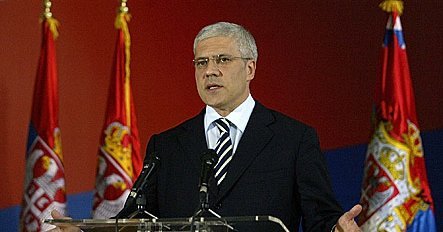A coalition was formed between President Tadić’s pro-European Democratic Party (DS), Prime Minister Vojislav Kostunica’s centre-right Democratic Party of Serbia (DSS) and the small liberal-conservative G17 Party. Even so, only a few days after the election the declaration of an independent Kosovo started to affect the stability of the coalition resulting in its eventual collapse on March 8th and bringing Serbians back to the polls.
The political crisis after Kosovo’s independence
It is not the declared independence of the Kosovo province itself but rather its consequences for the relations with the European Union - and thus the future of Serbia - that divide Kostunica’s nationalist ministers from those who remain loyal to Tadić. The last elections were said to be a referendum on Serbian accession to the EU, since they opposed its supporters and opponents. In choosing to build a coalition with Tadić, Kostunica tipped the balance towards an alliance with the West but he eventually regarded any cooperation with the EU as dependant upon the Kosovo issue. “All parties in Serbia, with no exception, want Serbia to join the EU, but the difference is: with Kosovo or without it?” Kostunica said. After the majority of EU member states recognised Kosovo’s independence, the prime Minister and leader of the DSS Vojislav Kostunica has been the main actor involved in collapsing the government by withdrawing its support for Tadić’s EU-oriented policies. On April 9th Serbia has signed the Stabilization and Association Agreement (SAA) in Luxemburg , an agreement that is widely seen as the first step towards EU membership. The radicals, but also some ministers of the DSS, have stated that this agreement doesn’t accurately reflect the will of the Serbian people, and some even went as far as to call it ‘an act of treason’.
What role for Kostunica?
Since the polls suggest that no single party will secure a majority, cooperation between at least two parties will be required to form a viable government following the elections on Sunday. When one considers the divisiveness of the cabinet and origin of the current political crisis, it seems unlikely that the current coalition will work together in the same cabinet. This is where speculations begin: will Vojislav Kostunica break the ‘taboo’, turn his back to the EU and to Tadić, opting to form a coalition with the Serbian Radical Party - whose actual leader, Vojislav Šešelj, is still waiting to be judged for war crimes in The Hague? Will Mr. Kostunica manage to convince his constituents to identify with the recent declarations made by Nikolić, who stated that he, like Milošević, would not relinquish Kosovo and furthermore that he would never allow for the extradition of Karadžić and Mladić (both indicted for war crimes)?
Kostunica remains the unknown element that will influence the upcoming elections
Nikolić, on his side, has already declared his will to collaborate with the DSS. He asked Kostunica to clarify the position of his Party and to tell the voters with whom he will form a post-electoral coalition. Both parties actually agree on opposing ties with the EU, unless the latter recognizes the Serbian sovereignty over Kosovo...which is, by the way, not going to happen. Nevertheless until today, certainly out of political calculations, Kostunica has remained silent on what would happen after the 11th of May. He remains the unknown element that will influence the upcoming elections, the one who initiated the collapse of the last government and brought Serbia away from the EU and ever closer to the courtyard of the Russian Federation. This is why his position, on Monday 12th May, will certainly have serious consequences for the future of Serbia. However, Vojislav Kostunica should be very cautious: though he is a key actor and wields considerable influence over the current situation, if he goes too far he could also lose the political profile of his Party, jeopardizing its unity and its chance to govern.
If the last election was a plebiscite on eventual EU accession, then Sunday will be a referendum on the Kosovo issue: are the Serbians willing to sacrifice an EU rapprochement over a province they are likely never to get back? No matter one’s opinion over the declaration of independence, the fact is that, for the second time in history, the battle over Kosovo is already lost. The elections on Sunday will demonstrate to observers whether Serbia will choose to accept the loss of Kosovo and move on, or whether it will dedicate its future to dealing with the past.


Follow the comments: |
|
